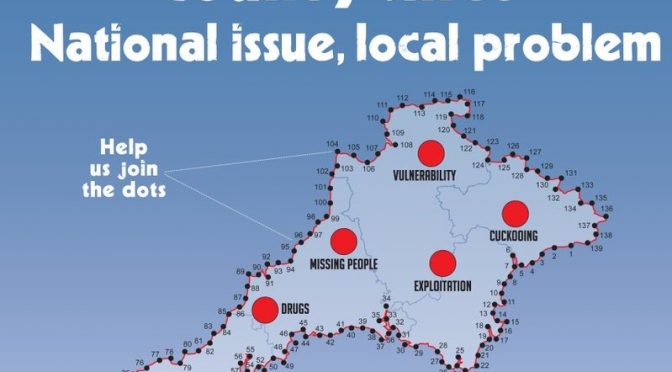County Lines: National Issue, local problem

What are “county lines”?
Urban criminal gangs travelling to Devon and Cornwall to sell illegal drugs. “The brand” – a single telephone number, operated from outside the area, for “customers” ordering drugs.
What should you look for?
- Vulnerable people being cuckooed (bullied) from their homes
- Lone children from outside of the area
- Individuals with multiple mobile devices or SIM cards
- Young people with more money, expensive clothing, or accessories than they can account for
What can you do?
Keep your eyes open and report suspicious activity
Call: Devon & Cornwall Crimestoppers 0800 555111
Email: *protected email*
Report Online: http://dc.police.uk
To further support frontline staff – particularly council safeguarding leads, as well as staff working in social care, health, children and young people, and community safety – identify potential victims, the Home Office has produced a range of resources, including a guidance booklet and posters. We encourage you to use these resources to help your staff understand the signs to spot potential victims and the action they should take to safeguard the young people.
Products:
- Spot the signs poster (various forms)
- Guidance booklet
- News article for use in newsletters, e-updates (below)
Across the country, young people and vulnerable adults are being exploited by gangs to move and sell drugs on their behalf in suburban areas, market towns and coastal regions. This criminal activity is known as ‘county lines’, as young people travel to different regions where they’re unknown to the police and can therefore operate undetected. These young people can be as young as 10 and are often subjected to threats, violence, and sexual abuse by the gangs.
To safeguard vulnerable young people from being exploited by ‘county line’ gangs, the Home Office is working with Crime Stoppers and the Department for Communities and Local Government to increase awareness among professionals who may encounter victims of the signs to spot and encourage staff to report their concerns to their safeguarding lead.
The signs to spot are:
- Persistently going missing from school or home, or being found out-of-area
- Unexplained acquisition of money, clothes, or mobile phones
- Excessive receipt of texts or phone calls
- Relationships with controlling, older individuals or gang association
- Leaving home or care without explanation
- Suspicion of self-harm, physical assault or unexplained injuries
- Parental concerns
- Significant decline in school performance
- Self-harm or significant changes in emotional well-being
The Home Office has produced resources to help council staff recognise the signs to look out for, that could indicate that someone is a victim. Staff should report their concerns to their safeguarding lead.
Partner Agency Intelligence Form (Aug 2018)
Other useful links:-
- NCA National Briefing Report
- Children’s Society Toolkit
- SWCPP resources
- Home office resources
- BBC news article describing County Lines